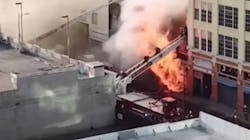Los Angeles FFs on Ventilators after Inhaling 'Superheated' Air
With much talk about ventilators in the COVID-19-era, it didn’t go unnoticed Saturday night that at least two firefighters ended up on the ubiquitous breathing machines.
Ventilators have, to a degree, become a household word in the midst of the coronavirus, as they’ve become vital tools — at a premium in local hospitals — in helping virus-stricken patients breathe.
RELATED:
- Powerful Blast Injures 11 Los Angeles Firefighters
- Two Los Angeles Firefighters Still Critical but Stable after Blast
In the case of the virus, they are often a last resort, when a patient’s lungs have been damaged to the point that the body is not getting enough oxygen — when a patient goes into respiratory failure.
The difference here is that the firefighters were not going into respiratory failure, but they did arrive at County USC Medical Center showing early sings of swelling of the airways, said Dr. Marc Eckstein, of County USC, who is also medical director of the Los Angeles Fire Department.
In the case of the injured firefighters, the function of the ventilators was the same, but their purpose was different. They were more precautionary, to make sure there was no lung damage after the firefighters inhaled “superheated” air and highly toxic gases.
You might have seen that function in your favorite medical television show.
The patient is intubated — that is, a tube is placed through the mouth or windpipe (doctors said the firefighters were “heavily sedated” in this process). Another tube is attatched to the ventilator, which is pushing air and oxygen into the patient’s lungs.
Effectively, this provides pressure into the body, which helps hold open the lungs, so air sacs inside don’t collapse. It also makes it easier to clear the windpipe if the patient is too weak to cough.
Doctors wanted to observe the firefighters’ airways, to make sure that the risk of swelling in the lungs or other lung injuries pass — in essence, to make sure their airways were secure.
Burn specialists were set to do further scopes of the lower airways on Saturday night, but Eckstein was hopeful.
“We have every anticipation the firefighters will pull through,” he said.
———
©2020 the Daily News (Los Angeles)
Visit the Daily News (Los Angeles) at www.dailynews.com
Distributed by Tribune Content Agency, LLC.
